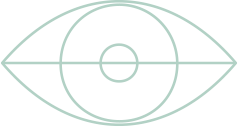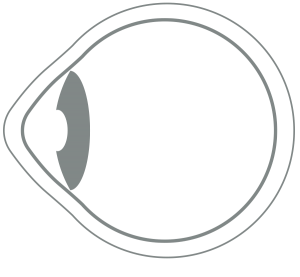With effective keratoconus treatment, we are committed to having patients see 20/20 vision.
Seeking exceptional care and keratoconus treatments in Melbourne? Look no further than Vision Camberwell for comprehensive treatment and support.

Seeking exceptional care and keratoconus treatments in Melbourne? Look no further than Vision Camberwell for comprehensive treatment and support.
Keratoconus is a progressive eye condition that affects the central zone of the cornea.
The cornea is normally dome-shaped. With keratoconus, your cornea thins and becomes cone-shaped. This change in the shape of the cornea leads to distorted vision and reduced vision quality.
There is no known cure for keratoconus. However, keratoconus can be treated and managed with various corrective aids, like specialised contact lenses. For people developing keratoconus, timely diagnosis and treatment is essential.
Vision Camberwell is an industry leader in providing care to patients with this condition. We offer treatment options and keratoconus corrective lenses.
The exact cause of keratoconus is unknown. However, certain factors like genetics and environmental causes can increase the likelihood of developing progressive keratoconus.
These factors include:
To manage keratoconus, it is recommended that you get regular check-ups every 6-12 months. Our keratoconus optometrists are renowned for providing thorough evaluations and personalised treatment plans.
Find out how we can help you today. Visit Vision Camberwell for keratoconus lens specialist Melbourne-wide.


Recognising the signs and symptoms of keratoconus is crucial for early detection and intervention.
Keratoconus is a condition that is often discovered in the teenage years and progresses as the patient gets older.
Some common symptoms of keratoconus include:

To diagnose keratoconus, your optometrist would take a complete medical history and conduct a thorough eye exam. Tests to diagnose keratoconus, including corneal topography and tomography, slit-lamp exam, and pachymetry, are used. These tests map the cornea and measure the thinnest areas to detect abnormalities. These advanced diagnostic tools are crucial and allow optometrists to assess the cornea’s thickness and curvature, providing vital information about the disease’s progression.
Early detection and regular monitoring can lead to timely intervention, potentially preserving vision and improving quality of life. By choosing an optometrist equipped with this technology, patients can ensure they receive comprehensive care tailored to their unique needs.
At Vision Camberwell, our keratoconus optometrists in Melbourne can conduct thorough testing for an accurate diagnosis and provide a comprehensive treatment plan. Whether you want to get a diagnosis or already have moderate keratoconus, our team can help. Our optometrists are also experienced in dealing with cases of severe keratoconus.

At Vision Camberwell, we offer a range of advanced treatment options for keratoconus. Current treatment options include keratoconus contact lenses and a corneal crosslinking procedure:
In the early stages of keratoconus, spectacles or soft contact lenses may provide adequate vision correction. Glasses or soft contact lenses can provide relief from symptoms.
Rigid gas permeable contact lenses and scleral contact lenses for keratoconus are the most common forms of contact lenses used to improve vision. Scleral lenses completely vault over the cornea and sit on the sclera (the white part of the eye surface). They provide a superior level of vision, stability and comfort.
Hybrid lenses combine the benefits of hard contact lenses for keratoconus and soft lenses, providing excellent vision and comfort.
Our optometrists will guide you through the available keratoconus treatment options and recommend the most suitable treatment plan for your unique case.
Corneal Collagen Crosslinking (CXL) is a groundbreaking treatment for keratoconus. While the Collagen Cross-linking (CXL) procedure itself is performed by eye specialists, the Vision Camberwell team is actively involved in supporting and guiding individuals both before and after their CXL treatment.
Our goal is to offer comprehensive support and provide valuable information throughout the entire process.
During the Collagen Crosslinking procedure, a special solution of riboflavin (Vitamin B2) is applied to the cornea, which is then activated with ultraviolet (UV) light. This combination of riboflavin drops and UV light creates chemical bonds within the cornea, increasing its strength and stability.
By undergoing Collagen Crosslinking, patients with keratoconus can potentially slow or halt the progression of the disease, preserving their vision and reducing the need for more invasive interventions such as corneal transplantation.
At Vision Camberwell, we are committed to providing personalised care and staying up to date with the latest advancements in keratoconus treatment.
Schedule a consultation with us today to discuss your options and take a proactive step toward maintaining your visual health.
Led by optometrist Shonit Jagmohan, who is internationally recognised for his expertise in keratoconus, our team at Vision Camberwell has extensive experience in managing this condition and providing exceptional treatment and care to our patients.
Shonit’s involvement in groundbreaking research and lens development ensures that we stay at the forefront of advancements in keratoconus treatment. He is known for his expertise in fitting a wide range of contact lenses for keratoconus, corneal grafts, post-trauma, and complicated eyes.
Optometrist, Jue Wang, also has extensive experience in managing keratoconus and conducts consultations in both English and Mandarin Chinese.
As the leading keratoconus lens provider in Melbourne, we have a deep understanding of the condition and advanced treatment options. We are dedicated to improving vision and enhancing the quality of life for individuals living with keratoconus.
Here are the reasons to choose Vision Camberwell for your keratoconus care:
Our optometrists in Melbourne have decades of combined experience and expertise in diagnosing and treating keratoconus. We stay up-to-date with the latest advancements in the field to provide you with the highest level of care. Book an eye exam with our experts.
At Vision Camberwell, we use state-of-the-art equipment to accurately diagnose and monitor keratoconus. Our advanced diagnostic eye care tools ensure precise measurements and enable us to tailor treatment plans to your individual symptoms.
We understand that each patient’s case and progression of keratoconus is unique. That’s why we take a personalised approach to develop treatment plans based on your specific needs, lifestyle, and visual requirements. We offer multiple treatment options, including contact lenses and eye wear.
Vision Camberwell offers a wide range of treatment options for keratoconus, including complex contact lenses such as RGP lenses, scleral lenses, hard contact lenses, and hybrid lenses. We work closely with you to determine the best option for optimal vision correction and comfort.

Here are some frequently asked questions about keratoconus and its treatment:
If you want an optometrist with experience in keratoconus in Melbourne, choose Vision Camberwell. We are located in Melbourne’s Inner East. We are 10km from the CBD (350m from the train station and 100m from the closest tram stop) making us easily accessible to individuals seeking treatment for keratoconus in Melbourne. You can also order keratoconus contacts and keratoconus lenses at Vision Camberwell.
At Vision Camberwell, we have been looking after the majority of patients with keratoconus in Victoria for over 50 years. Our team includes optometrists who can accurately diagnose and treat vision loss and the progression of keratoconus.
Our principal optometrist, Shonit, is highly regarded for his expertise in fitting a wide range of lenses for keratoconus. As part of the groundbreaking Research and Development team within Innovative Contacts, Shonit helped develop EyeSpace Sclerals and the revolutionary EyeSpace software. His role in troubleshooting scleral and RGP lens designs for optometrists across Australia and New Zealand offered him the unique opportunity to gain advanced knowledge in custom contact lens design.
Optometrist Jue Wang developed a special interest in complex contact lenses for complicated eye conditions such as keratoconus and post-graft corneas, as well as managing progressive myopia. He brings his expertise to patients of all ages and can provide treatment in English and Mandarin Chinese.
Meet our team or contact us to learn more.
Yes, depending on the severity of keratoconus, customised contact lenses like rigid contact lenses, lenses, scleral lenses, hard contact lenses, or hybrid lenses can improve vision by providing a smooth surface for light to focus through.
Keratoconus is prevalent in Australia and at Vision Camberwell, we have extensive experience in diagnosing and managing this condition.
According to the Centre for Eye Research Australia, one in every 84 Australians 20-year olds has keratoconus.
Yes, Vision Camberwell is one of the few places in Australia that takes into account and corrects Higher Order Aberrations (HOAs) in contact lenses for keratoconus patients, especially for the advanced cases of keratoconus. By addressing these aberrations, our specialised contact lenses for keratoconus provide unparalleled vision quality, reducing flaring and shadowing of letters and lights, and significantly increasing sharpness in vision. Our commitment to correcting HOAs ensures that our keratoconus patients experience enhanced visual clarity and a more comfortable wearing experience with their contact lenses.
Book with Vision Camberwell to find an optometrist.
The next steps involve scheduling an appointment at Vision Camberwell. Our optometrists will evaluate your specific case, discuss treatment options, and guide you through the recommended course of action.
It’s time to take the next steps towards improving your vision.

References: